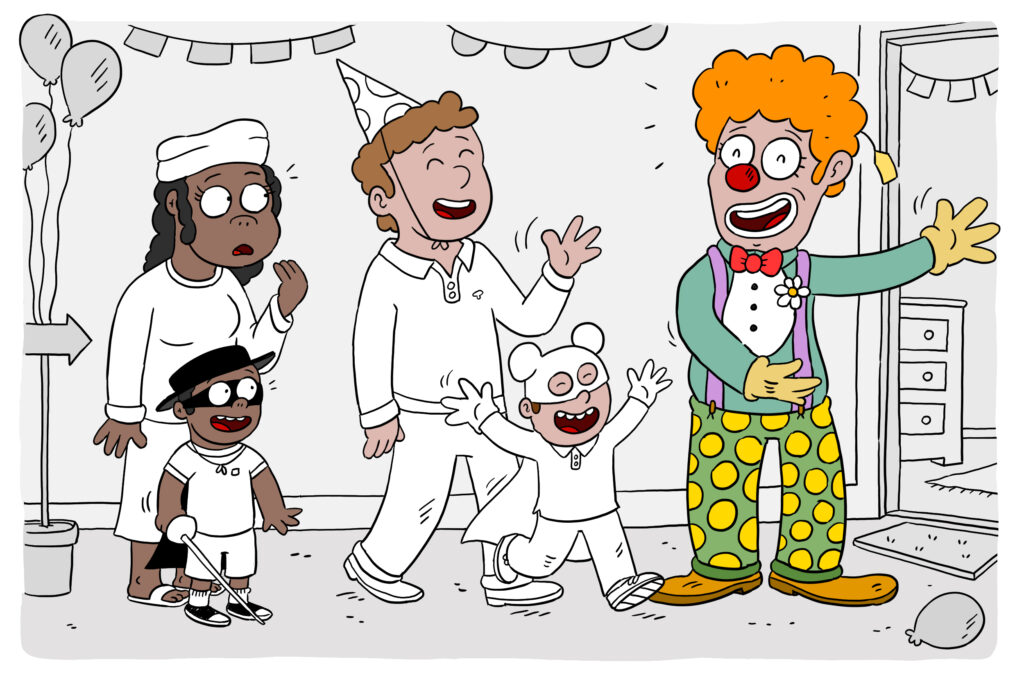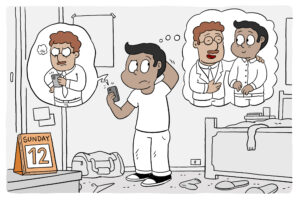
The Nigerian Adeola brings her little son Fela to a costume party at school. How nice that the school is hosting a party! Her little son has been looking forward to it for a whole week. They spent as much as two afternoons working on his pirate costume. He has already received several compliments on it today!
Peter Kuipers, the school principal, is also looking forward to the day. It is an important day where he really participates and is approachable to the students. “Today I’m not the strict principal for a while,” he thinks a little relieved. “Therefore, a clown costume seems fitting for such a happy day!”
When Adeola arrives at school, she is surprised to see that Mr. Kuipers is also dressed up. As a clown no less! How strange and unprofessional. A principal is not a clown. Deep down she finds it actually disrespectful.
But she doesn’t want to spoil the fun and smiles kindly at him. First make sure Fela has a good time, the little talk with Mr. Kuipers will come later.
Where is the connection?
By dressing up as a clown, Peter tries to make the distance between him and the students a little smaller. Self-mockery is often used in the Netherlands to avoid being too important. After all, we are all equal. The principal is not a clown of course, he is dressed as a clown.
In very many cultures, authority is accepted and also seen as desirable. The director is the boss, knows the most and people can submit to that. A clown costume does not fit Adeola’s image of the principal. Parents from Nigeria like to see their children go to a good school where there is respect for the principal. Adeola also sees Mr. Kuipers today as a representative of the school, not a clown. Self-deprecating then is a lack of respect for the position and those who depend on Mr. Kuipers. As in this case, the parents. The principal is not a clown. That regard is certainly reflected in education, where the teaching style is also often much more authoritarian. The students accept what the master says.”
But humor and self-deprecation is not natural. It depends on how it is used. In African cultures, on the contrary, people use humor and drama to address those in power. It is an indirect, and therefore more accepted, form of criticism of the boss. Then at a school party, for example, a teacher would portray the principal in a clown suit.
In this story, Peter also has the task of reassuring Adeola. He does not have to adapt, but he also cannot ignore the feelings of Adeola and her family.
It is important to read between the lines. To read the air as people often say. Adeola will not express her surprise directly, she will be friendly and smile along. But may not stay as long as she otherwise would. He might take the family aside for a moment to discuss this.
If there are more expats and migrants, an explanation of this typically Dutch state of affairs could be given in the advance notice. And that it has nothing to do with the quality of education.
For Adeola, this is a great example of how Dutch society is not very fond of authority. She can accept that the principal leads in a different way and that this does not compromise the quality of education. She can focus on how teachers interact with students and what they learn. Even though Mr. Kuipers, Peter, is at a party dressed as a clown. And as always, she can express her surprise.
So if we summarize: The Netherlands has an egalitarian society, the boss is accessible and should not think too much of him or herself. As a result, status is less important and not even desirable. On top of that, in the Netherlands we don’t like bragging anyway. Just act normal and you’ll be crazy enough. And if you do act crazy, then out of self-mockery. Self-criticism and modesty are more appreciated than compliments.
And so in Nigeria, people look at authority very differently. The boss may and should be the boss. He or she is allowed to show it. There is status involved. There is a clear separation between teachers and students. Students are used to the idea that the teacher tells, the students listen, and every now and then they are allowed to politely ask some questions.
In short
For Peter:
- Accept that the Adeola comes from hierarchical society and that the director has status and deserves respect.
- Adeola is not likely to show what she really thinks. Watch for other signs in her communication. This includes leaving earlier.
- Create the opportunity to talk about his role as director.
- In the advance announcement, give some extra attention to the informal and funny atmosphere of the party.
For the Adeola:
- Accept that Dutch has an egalitarian society.
- Accept that a principal derives his authority from good learning outcomes, not formalities.
- Above all, ask your questions and express your surprise. The Dutch are used to being addressed directly.
Want to read more about culture dimensions?
Important to know:
This anecdote is based on stories shared with us. Connect2Us strives to highlight the dilemma from both sides and not to label people or suggest that one or the other should behave differently. Awareness by those involved is enough to move toward each other. Without pretending to be very different. Connect2Us aims to help readers recognize and avoid prejudice. Read about prejudice, discrimination and racism here.

